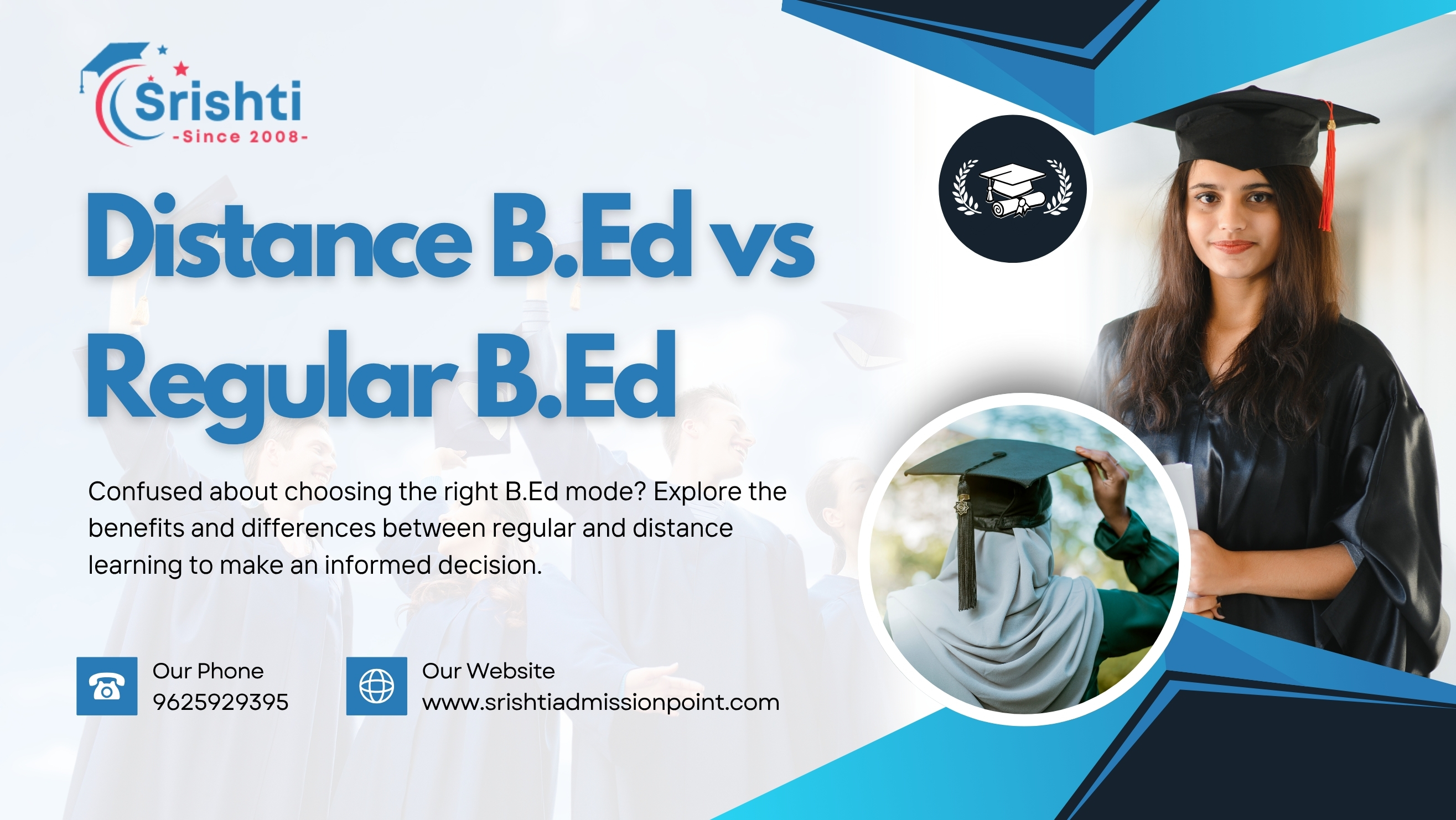
To build a successful career in the field of teaching, choosing the right B.Ed. The program is a crucial step. Applications for B.Ed. Admission 2025 in various universities have begun, and students are considering both distance B.Ed. and regular B.Ed. Options. But which option is right for you? This blog will guide you through both options and help you make an informed decision.
What is a Distance B.Ed?
A Distance B.Ed is a teacher training course designed for students or working professionals who cannot attend regular classes. It is offered by many reputed universities in India, often approved by UGC or NCTE. Students can complete the course via online materials, weekend sessions, or through study centers. These courses are ideal for individuals who are already employed or who have other responsibilities that make attending full-time college difficult.
Distance learning also enables students to learn at their own pace. Most distance B.Ed programs offer flexibility in terms of submission deadlines, exams, and study schedules. This format is beneficial for candidates from rural areas or those who wish to pursue dual degrees.
What is a Regular B.Ed?
The Regular B.Ed. The program is a full-time, in-person course that typically spans two years. It includes classroom lectures, workshops, teaching practice, and internships. This format is best suited for students who can commit to daily college attendance and are seeking hands-on training.
In a regular B.Ed. Students have the opportunity to interact closely with faculty, peers, and mentor teachers. The well-organized environment and access to academic resources on campus make it a preferred choice for fresh graduates who aim for comprehensive education and preparation for competitive exams.
Key Differences: Distance B.Ed vs Regular B.Ed
- Mode of Study:
- Distance B.Ed: Online or study center-based with self-paced learning.
- Regular B.Ed: Full-time on-campus with fixed classroom schedules.
- Flexibility:
- Distance B.Ed: Offers greater flexibility for working professionals and homemakers.
- Regular B.Ed: Requires regular attendance and fixed class hours.
- Eligibility:
- Both formats usually require a graduation in any stream with a minimum percentage.
- Some universities may conduct entrance exams or interviews.
- Internships:
- Regular B.Ed: Includes mandatory teaching practice, lesson planning, and classroom experience.
- Distance B.Ed: May include optional short-term internships or workshops at recognized schools.
- Cost:
- Distance B.Ed: Generally more affordable with lower tuition and no accommodation expenses.
Regular B.Ed: Higher costs due to full-time attendance, campus facilities, and hostel fees.
Who Should Choose Distance B.Ed?
- Working professionals who want to become certified teachers.
- Students who cannot relocate or manage daily college hours.
- Parents or homemakers looking to re-enter the workforce.
- Candidates who have already done B.Ed after graduation in another format, but seek formal training or a second specialization.
The Distance B.Ed is also suitable for those who wish to pursue higher education alongside their work. Many institutions, such as IGNOU, VMOU, and KUK, offer recognized Distance B.Ed programs with UGC-approved degrees.
Who Should Choose Regular B.Ed?
- Fresh graduates who want structured, interactive classroom learning.
- Students preparing for teaching exams, such as CTET, TET, or state-level eligibility tests.
- Those aiming for government school jobs that require supervised training.
- Aspirants looking for direct campus placements and career support.
Suppose you are looking for a B.Ed course in Delhi. In this case, the city has several top institutes, including GGSIPU, DU, and Jamia Millia Islamia, that offer strong academic training along with practical experience through internships.
Career Opportunities After B.Ed
Both Distance and Regular B.Ed programs open up a wide range of teaching and education-related job roles:
- Government School Teacher (Post CTET/TET qualification)
- Private School Educator (CBSE/ICSE/State Boards)
- Academic Coordinator
- Online Teaching/Tutoring
- Curriculum Developer
- Special Education Teacher
- Education Counselor or Consultant
Candidates with a B.Ed can also apply for central or state government jobs, coaching institutes, NGOs, or even pursue an M.Ed for further specialization.
Challenges to Consider
- Distance B.Ed:
- Limited face-to-face guidance.
- Fewer peer interactions and live teaching opportunities.
- Needs strong self-discipline and time management.
- Regular B.Ed:
- Requires full-time commitment.
- It may not be suitable for working professionals or parents.
Higher financial investment due to tuition and lodging.
Is Distance B.Ed Valid for Teaching Jobs?
Yes, a distance learning B.Ed. is valid for teaching jobs in India, provided the course is completed at a university recognized by the UGC and NCTE. Candidates must also meet additional eligibility criteria, such as passing the TET or CTET for posts in government schools. Always check the recognition and approval status of the institute before enrolling.
Final Thoughts
The choice between distance and regular B.Ed. Depends on your individual needs, lifestyle, and goals—the process of B.Ed. Admission for 2025 has begun, and it is the perfect time to evaluate your options and take the next step towards a fulfilling teaching career.
If you're looking for expert guidance and direct admission to top universities without an entrance exam, Srishti Admission Point can help. Whether you pick Distance B.Ed for flexibility or Regular B.Ed for immersive training, both paths can lead to meaningful career growth in education.
Recent Post








